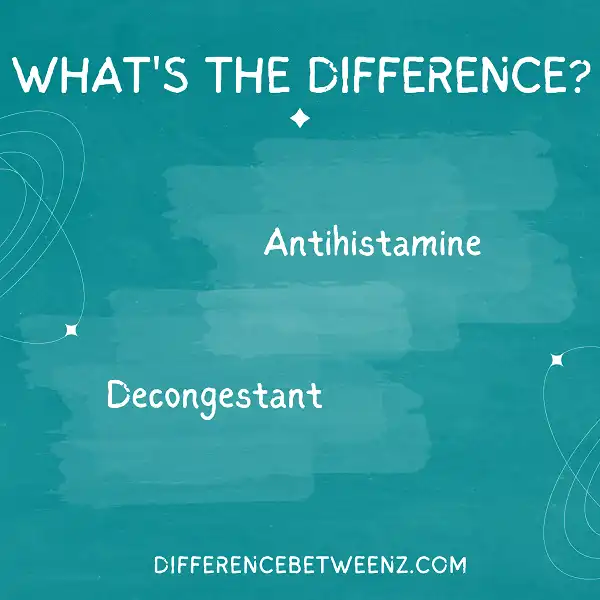Do you have a stuffy nose that’s causing you to breathe heavy and struggle through the day? You may be looking for something to help relieve your symptoms so that you can feel better quickly. Have you considered an antihistamine or decongestant, but aren’t sure which one is right for your needs? You’re not alone! Keeping track of the different types of medications available to treat health issues can be daunting, especially if you’re unsure what each medication does. In this blog post, we’ll discuss the difference between an antihistamine and a decongestant so that you can make informed decisions when managing your own allergies or cold symptoms.
What is Antihistamine?
Antihistamine is a type of medication that works to reduce the effects of a heightened immune response experienced when the body experiences an allergic reaction. Antihistamine medications work by blocking the action of histamine, a chemical produced by the body that can trigger sneezing, watery eyes, and swollen or itchy skin.
Antihistamines are available both over-the-counter and by prescription, depending on the severity and individual sensitivity to allergic reactions. Antihistamines come in many forms including pills, liquids, tablets, and nasal sprays. Ultimately, Antihistamines are efficient tools that help alleviate allergy symptoms and improve the quality of life in people who experience allergies regularly.
What is Decongestant?
Decongestant medication is a type of drug that helps to relieve symptoms of congestion in the nasal passages, sinuses, throat, and chest associated with colds, allergies, and other respiratory conditions. Decongestants can come in the form of pills to swallow, liquids to drink, or sprays that you can use directly into your nose.
Decongesting medications shrink the blood vessels in your sinuses, which reduces inflammation and mucus production. Decongestants are not meant for long-term use but will provide immediate temporary relief from uncomfortable congestion. Talk to your doctor if you think decongesting medication could be helpful in relieving your symptoms.
Difference between Antihistamine and Decongestant
Antihistamine and Decongestant are two types of medicines used for allergen treatments, but their functions are different.
- Antihistamines target the actual allergic reaction caused by the immune system, stopping inflammation in the body to soothe symptoms like sneezing, itching, or rashes.
- Decongestants, on the other hand, act directly on your nasal passage and sinuses to reduce swelling and relieve congestion. They can be in spray form or taken orally as a pill or tablet, making them very versatile for getting rid of breathing problems caused by allergies or colds.
This makes Antihistamine and Decongestant powerful medications in addressing common allergy issues and asthma-related breathing troubles.
Conclusion
Antihistamines and decongestants are both types of medication that can be used to treat allergies, colds, and sinus infections. Antihistamines work by blocking histamine production, which decreases inflammation and congestion. Decongestants work by shrinking swollen blood vessels in the nose, which reduces congestion. Both types of medications have their own pros and cons, so it’s important to talk to your doctor to see which one is right for you.


